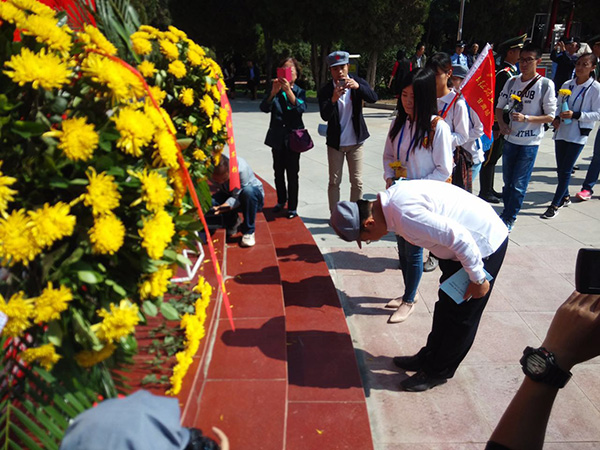


 |
|
A man participates in a ceremony to memorialize fighters in the revolution. [Photo provided to chinadaily.com.cn] |
There is a strong national interest in revolutionary history, especially things that happened from the 1930s to 1949, when the People's Republic of China was officially founded. There is a similar interest in the United States regarding its civil war, and there are numerous parallels: the last massive conflict on home soil, families torn apart, and a war motivated by ideals as much as anything else.
There are of course innumerous differences between the two, but placing what I was seeing in that context helped me understand the behavior. And in the same way that the US civil war is a huge tourism draw, I could see why local and national governments are investing so much in Red Tourism.
Take for instance Shenjialing, a small mountain village in eastern Gansu province and a major battle site. The area has received a 200-million-yuan investment to build a resort centered around communist history, which will hopefully stimulate the local economy. With investments that large in areas that remote, investors and the government are believing that this type of tourism will continue to grow.
But there are a few specific areas I hope receive more attention. While these massive memorials and reconstructed gates are impressive at first, they lack the gravity of authenticity. Photos and plaques are the go-to medium for most of the museums we've visited, but I wish there were more artifacts, that these smaller museums could be entrusted with more bits and pieces that haven't been washed away by the passing of time.
However, nothing in any of the museums or at any of the historic sites was as impactful for me as meeting a couple of men in Shenjialing who lived through the conflict. Both were ten years old when the war came to a close, having known nothing but conflict in their lives. What they saw and experienced is more valuable than any rusty sword or decommissioned cannon.
As I watched my fellow reporters swarm these men with their questions, it made me happy. However, even a busload of journalists is not enough to fully record and encapsulate the experience of living through war. I hope more efforts are made to preserve these stories before they too are lost to time.
